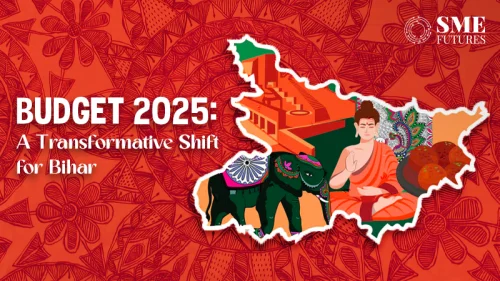The year 2024 is poised to be a transformative period for Generative AI, a technology that has rapidly advanced in recent years. The insights and perspectives of experts from various domains help us in identifying the multiple upcoming opportunities in the field as we explore the impact of Generative AI on digital marketing, communication, industry-specific applications, innovation, and the broader business landscape.
This is going to be an exciting period for humanity as more and more work is being put into making it better and more sustainable, and a change in how we perceive and utilise this power is on the horizon.
“Human-led AI is undoubtedly like chalk and cheese. And yet, there is an undeniable power when they come together,” says Nandan Mishra, CEO & Co-founder, Algo8 AI.
Shaping digital marketing strategies and its impact on start-ups and small businesses
Nikita Vora, an automation coach and digital marketing consultant with over 15 years of experience, envisions Generative AI playing a pivotal role in reshaping digital marketing strategies in 2024. The technology is set to redefine customer engagement by enabling the creation of highly personalised content at scale. AI algorithms will craft bespoke marketing campaigns, dynamically generate content based on individual preferences, and integrate AI-driven chatbots and virtual assistants to deliver unparalleled customer experiences.
“Generative AI technology has seen remarkable progress since its inception. Its roots can be traced back to early AI research, where rule-based systems attempted to generate text or speech. However, it was in the 2010s that deep learning and neural networks began to make a substantial impact,” says Sarvagya Mishra, Co-founder and Director, SuperBot.
Start-ups and small businesses are expected to reap significant benefits from Generative AI. By leveraging AI-driven tools for content creation, lead generation, and customer engagement, these enterprises can streamline their marketing efforts. This will enable them to reach their target audiences more effectively. Additionally, AI-powered data analytics will offer invaluable insights into consumer behaviour, enabling informed decision-making and efficient resource allocation.
Trends and innovations

Experts anticipate notable trends and innovations in the application of Generative AI for digital marketing and automation in 2024. These innovations may include the integration of AI into customer relationship management systems, allowing businesses to engage with customers more proactively and deliver personalised marketing communications.
Furthermore, AI-driven predictive analytics and decision-making tools are expected to empower businesses to anticipate market trends, optimise advertising strategies, and enhance overall marketing efficiency.
The development of AI-powered creative tools for designing visually appealing and interactive content is also on the horizon, providing businesses with the means to create engaging experiences that resonate with their target audiences.
Advancements in Generative AI
Generative AI technology has evolved significantly since its inception. It traces its roots back to early AI research, where rule-based systems attempted to generate text or speech. However, the turning point came in the late 2010s with the introduction of transformer-based architectures like those used in the GPT series. These architectures revolutionised the field and enabled the development of models capable of generating not only text but also images and audio.
Models like DALL-E and CLIP demonstrated the ability to generate images from textual prompts and understand complex relationships between text and images. The field of Generative AI is poised for continued growth in 2024, with a focus on refining and expanding its applications. These advancements aim to enhance the fine-tuning and customisation of AI models for specific tasks and industries, supporting content creation, predictive analytics, and ethical AI practices.
Generative AI has had a transformative impact on the communication between organisations and their clients. AI-driven voice bots and virtual assistants have revolutionised customer support by offering instant responses and guidance, leading to faster issue resolution and increased customer satisfaction. Moreover, AI-powered voice bots have enhanced accessibility for clients, particularly in sectors like healthcare, education, and e-commerce.
“Despite these advances, many companies are still unprepared for Generative AI’s widespread use, particularly in mitigating risks like inaccuracy, which is cited more than cybersecurity and regulatory compliance,” says Samanyou Garg, Founder and CEO, Writesonic.
What can we expect in 2024?
The field of Generative AI is poised to undergo significant advancements in the coming years, shaping various aspects of our lives.

“Multimodal Generative AI is expected to flourish, allowing AI models to seamlessly combine different modalities like text, audio, and images. This development will usher in more sophisticated and widely used generative content, including music videos, interactive stories, and immersive virtual worlds, thereby enhancing our digital experiences,” says Vinod K Singh, serial entrepreneur, tech visionary and advisor.
Explainable Generative AI will also gain prominence, as the demand for AI models capable of elucidating their reasoning and decision-making processes grows. This emphasis on transparency is vital for ensuring that Generative AI is harnessed responsibly and ethically.
Generative AI for code generation is also around the corner, promising to revolutionise software development. By automating code generation, it will democratise software creation, enabling individuals without coding expertise to craft their software and applications with ease.
“Generative AI will tackle the challenge of data scarcity through data synthesis. By generating new data, such as images, videos, and text, this technology will provide the necessary resources for training other AI models, thereby fostering innovation in various AI applications,” Singh points out.
Personalised experiences will also be transformed through Generative AI. It will be employed to create tailor-made user experiences, encompassing product recommendations, customised content generation, and personalised customer service.
“Scientific discovery is poised for a leap forward with the application of Generative AI. It will accelerate the scientific process by generating hypotheses, analysing data, and designing experiments, contributing to solving pressing global issues like climate change and diseases,” he adds.
Moreover, Generative AI will be harnessed for social good, addressing a spectrum of societal challenges. It will play a role in providing education and healthcare in underserved communities and promoting peace and understanding between different cultures, demonstrating its potential to create a positive impact on a global scale.
The personalisation power of Generative AI
One of the standout features of Generative AI is its personalisation capability. Organisations can tailor interactions to individual client preferences, leading to increased customer engagement and satisfaction. Cost savings are also achieved as voice bots and virtual assistants efficiently handle a large volume of client enquiries, allowing human teams to focus their efforts on more complex interactions.
Generative AI has also had a significant impact on the financial industry. Rangarajan Vasudevan, Chief Data Officer at Lentra, sheds light on the instrumental role of Generative AI in the banking and digital lending sector. The technology is being used for customer servicing and expanding into markets where vernacular languages pose a barrier.
“While there are challenges, such as data leaks and consistency in output and explainability, the industry is cautiously embracing Generative AI for its potential to automate lending and decision-making processes,” Rangarajan asserts.
The path forward: challenges and opportunities

“Generative AI challenges include technical complexity, integration with legacy systems, avoiding technical debt, workforce restructuring, and misuse monitoring. Companies typically respond with strategic integration, robust security, talent acquisition, bias mitigation, regulatory compliance, and public engagement,” says Tarun Katial, Founder and CEO, coto.
As Generative AI continues to evolve, it brings both challenges and opportunities. Data quality and bias remain significant concerns, as the technology’s outputs are heavily dependent on the quality and diversity of training data. Explainability and transparency are also issues that need to be addressed to ensure responsible AI use. Governance is critically necessary, especially in industries like finance, where regulations and compliance are paramount.

In conclusion, Generative AI is set to transform various aspects of our lives in 2024. From reshaping digital marketing to revolutionising customer communication and expanding into specialised domains, the potential of Generative AI is vast. The journey is not without challenges, but with a focus on governance and transparency, this technology is expected to continue its upward trajectory.
“For 2024, we can speculate that Generative AI will continue to evolve, potentially leading to the creation of new industries and transforming existing business models. The integration of Generative AI into various business functions is likely to become more widespread, and companies that are currently high performers in AI adoption will continue to lead the charge in exploring innovative applications of this technology,” Garg contends.
As we look to the future, Generative AI holds the promise of creating a more personalised, efficient, and innovative world, where the boundaries of human creativity and AI’s capabilities continue to blur.











